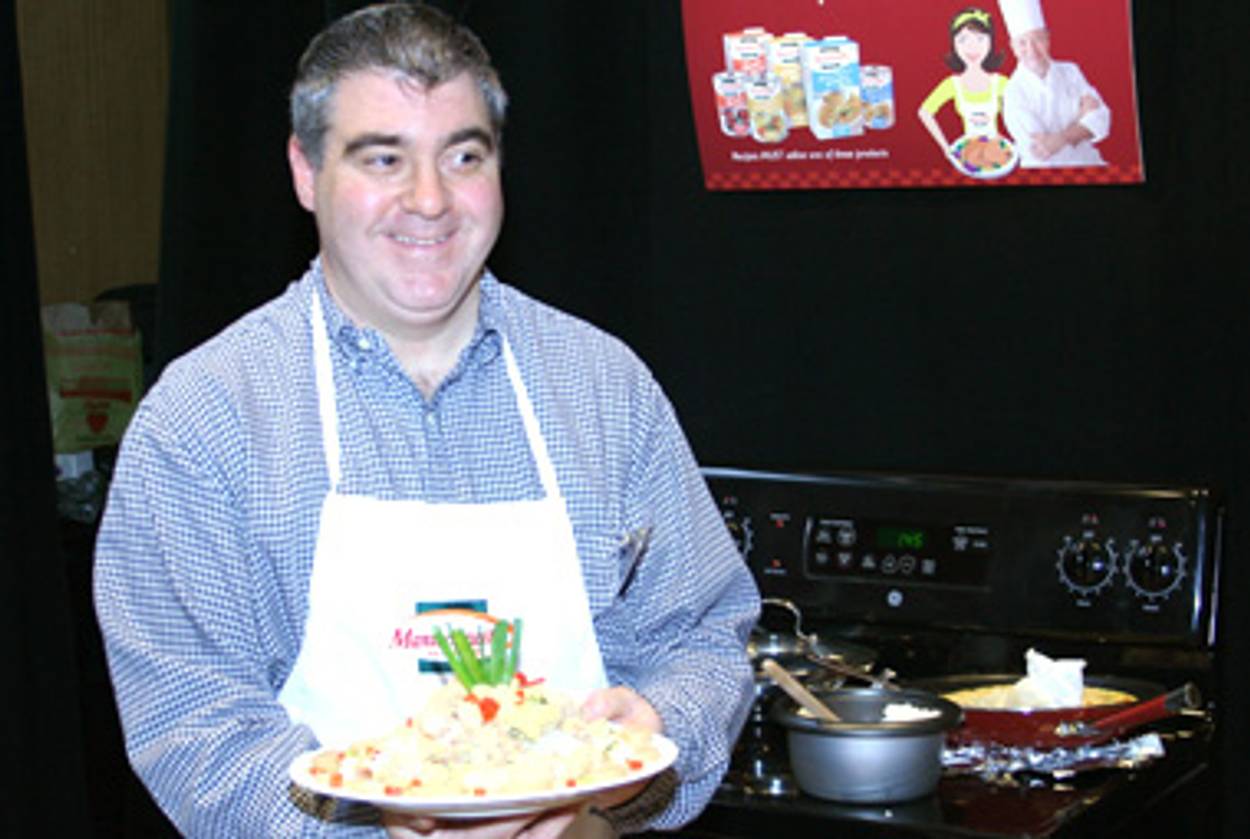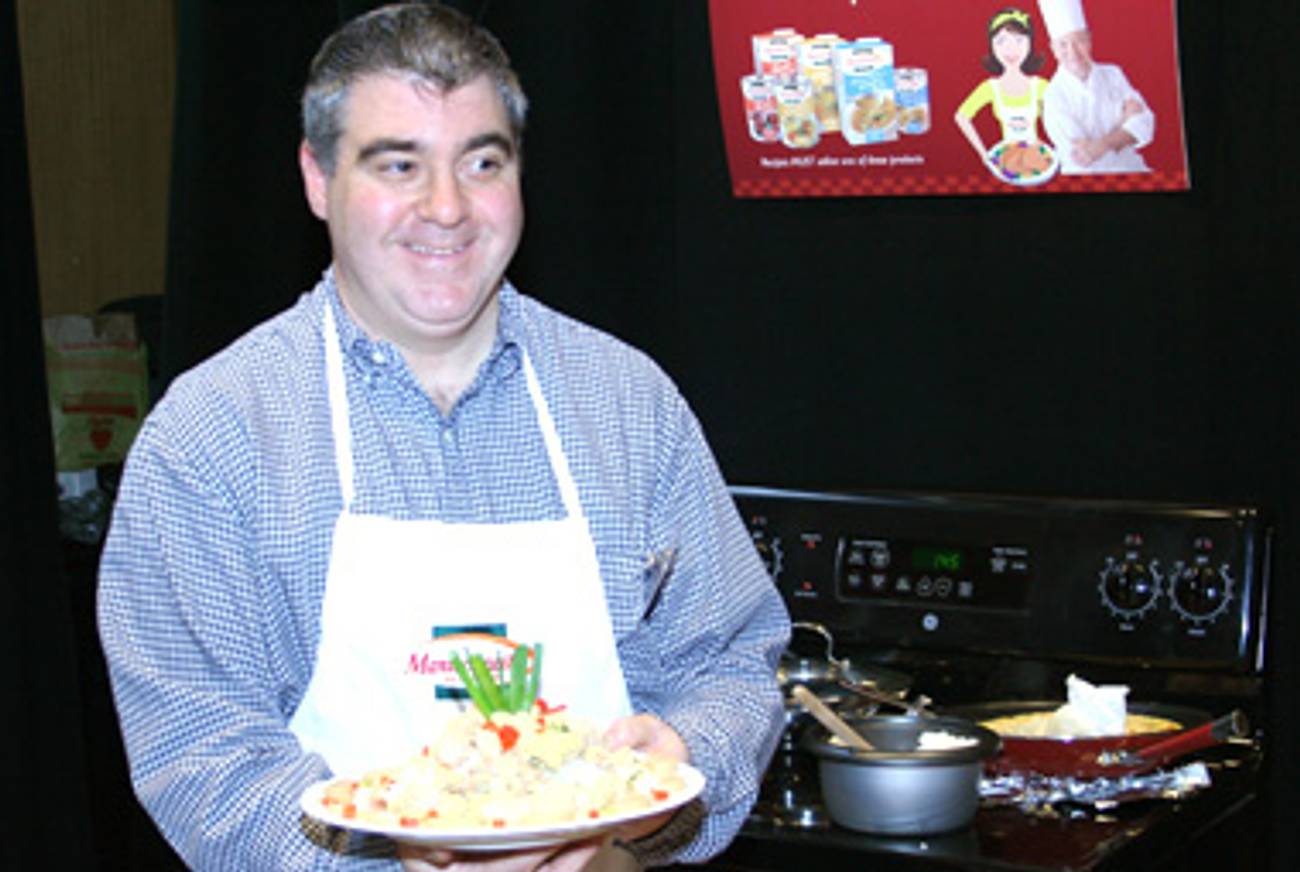Eat, Eat
At the Manischewitz kosher-cooking contest, the menu is international, the fanfare is intense, and the presiding judge is the legendary Jacques Pépin. Could kashrut be the ultimate Top Chef challenge?




There are several places in Manhattan that whenever I’m feeling homesick for my childhood I can always count on to smell just like my grandmother’s kitchen. They are 2nd Avenue Deli (both old and new); Fine & Schapiro on the Upper West Side, and more inexplicably, the entrance of the Bed Bath & Beyond on Sixth Avenue (you enter next to the in-store café). And now, in the culinary studio kitchen in the basement of the Manhattan Jewish Community Center on the Upper West Side, I think I’ve at last discovered the aromatic common denominator: Manischewitz chicken broth.
It’s bubbling away in dozens of pans on multiple stoves, permeating the air with its warm, sodium-concentrated yellow odeur. The only thing keeping me from drifting into full-fledged Proustian reverie is the Grandma-incongruous presence of Jacques Pépin, the legendary French chef, television personality, and cookbook author. Immaculate in perfectly tailored tweed, Pépin was at the JCC to head the judging panel for the 5th annual Man-O-Manischewitz Cook-Off, in which five finalists, culled from a field of thousands, would cook their original recipes for a chance to win $25,000 in cash and prizes, including a new GE oven, and the title of, um—
“Jewish Top Chef,” suggested Alain Bankier, Manischewitz’s C.E.O. The similarity to America’s most-beloved culinary TV competition was absolutely intentional. Under the leadership of Bankier and Paul Bensabat, his co-C.E.O, the Manischewitz Company is undergoing a major foodie rebranding effort, seeking to elevate traditional Jewish cooking to a refined international cuisine. “We’ve got a bunch of diverse contestants who have managed to come up with kosher dishes from all around the world,” Bankier tells me.
Bankier and Bensabat are both of Moroccan-Jewish origin (of the more than 30 new products Manischewitz is adding to its repertoire this year, Bankier spoke most fondly of the Moroccan fish balls, a highly spiced and toothsome alternative to gefilte fish adapted from his mother’s recipe), and their culinary heritage is reflected in the company’s new approach. “When I was a kid,” Bankier says, “people would say, ‘Oh, you keep kosher?’ and I would say, ‘Well, what’s wrong with that?’ ” Sephardi, and particularly Moroccan cuisine, he explains, developed completely differently than did traditional Ashkenazi cooking; milder climates providing a wealth of produce, colonial influences introducing a wide array of techniques. The ubiquity of the souk throughout the Arab world meant that you went shopping every day for what was local and in season, “very much how people like to cook today,” he says. Hence the focus on innovative recipes; hence Jacques Pépin, who is at the moment fussing over the plating of samples of his own contributions to the world of kosher cooking—a dish of braised chicken thighs with mushrooms and onions and a velvety mushroom vélouté. (“Without cream,” Pépin specified. I couldn’t help but think that somewhere, his great friend Julia Child was letting out a horrified gasp. “Normally, we finish with some cream, but of course, it’s kosher, so you cannot. We tried non-dairy creamer, but then we decided it was better to have it plain.”) He is otherwise schmoozing the pants off everybody with the twinkly Maurice Chevalier charm that so unstitched Julia Child during their PBS series together. Even at 75, he seems to be having the same effect on 25 or so assembled ladies of the Jewish press; when I tell him how much I had loved watching him on TV as a child, the woman behind all but shoves me out of the way, shrieking, “Well, I still love you how you are now, Jacques!”
I retreat back to the counter, where another woman, a writer for a food blog, asks me what I thought of the soup. I said I thought it was delicious, but think I missed the cream.
She leans her head conspiratorially close to mine. “You keep kosher?”
I confess I do not.
“So, you’ll go home and you’ll make it with the cream.”
Upstairs, the contest is beginning with much pomp and fanfare, including a proclamation from Mayor Bloomberg’s office declaring March 31 to be “Man-O-Manischewitz Day” in New York City. The five finalists, a blend of amateur home cooks and cooking-contest veterans, three of whom had never cooked kosher before, are given an hour to complete their recipes—which had to be strictly kosher and use at least two Manischewitz products, broths and flavorings being the most popular—at individual stations each outfitted with a prepared mise en place of their required ingredients and a full-sized, state-of-the-art GE stove (Enough product placement for you?). While the contestants cook, the audience is invited to partake of the caterers’ renderings of respective recipes, which are laid out in chafing dishes on the far end of the room.
Once the dust settles, the stampede of starving opinions starts to bubble up from the mob of journalists, mashgichim, JCC employees, and freeloaders who have come for the food and stayed for the judging: “I like the cherry tomatoes in the soup.” “The sweet potatoes are delicious; I’m a sucker for anything that tastes like tsimmes.” “So much chicken, nobody could make a brisket?”
As Alain Bankier promised, the dishes encompassed a wide range of cuisines, from Spanish-inspired fisherman’s stew made by New Jersey’s Suzanne Banfield, who was first inspired to create original recipes when she was diagnosed with celiac disease (perhaps the only dietary restriction more rigorous than kashrut), to the Moroccan chicken bowl created by Naylet LaRochelle, a Cuban-American school psychologist from Miami, although the main diversity in terms of the contestants came from the creator of the aforementioned golden sweet potato tagine, Jeanette Nelson, a mother of three and former Man-O-Manischewitz semi-finalist from Sophia, W.Va. (population 1,301), whose Hill Country drawl caused a ripple of amused awe through the heavily be-sheiteled crowd.
Stuart Davis, a Hebrew teacher (and former mortgage banker) from Cherry Hill, N.J., had brought along a cheering section of about 30, including his father, his children, and his childhood best friend, who is now a Hasidic rabbi, all of whom erupt with glee when Jacques Pépin pronounces Davis’ delicious chicken and egg donburi, a comfort dish he likened to “Japanese meatloaf,” the winner. I ask a jubilant woman in a floral slacksuit if she was a relative.
“No, not really; well, kind of,” she replies. “His niece is the girlfriend of my son. That’s how it is with all of us.” Brandishing a camera, she runs toward the throng of cheering well-wishers. It was a scene of jubilation to rival any Top Chef finale, and why not? “To cook kosher,” Jacques Pépin says, with a small shake of the head, “you must bring all your knowledge of ingredients and techniques. It is a challenge.” I would argue it’s the ultimate Top Chef challenge. A host of arbitrary, unbending rules—hugely restricted proteins, separate dishes, prescribed waiting periods between eating dairy and meat—which the breaking of any one means immediate disqualification. (Or other, more immediate penalties: My husband recently suffered second-degree burns to his hand while cooking a loin of pork, and my mother, only half-jokingly, told him it was Divine Punishment.) You can’t indiscriminately use butter or bacon, the two things that are guaranteed to make anything taste good—except for cream and lobster, which you can’t use either. You can hardly ever go out to eat, you have to get your kids to eat it, and instead of the length of a single restaurant service, these restrictions last forever. Even the most creative cook can use a little extra help.
“Manischewitz is a food company that’s really about recipes,” says Paul Bensabat. “It’s about taking these products and making them your own.” Maybe for him that means fish balls and the exotic spices of the Southern Mediterranean; for me, it’s matzo-ball soup and Tam Tam crackers dipped in cottage cheese, preferably in my dear departed grandmother’s kitchen, while everybody screams about how the other doesn’t know what they’re talking about. So, it’s no wonder that a great recipe like Stuart Davis’ strikes the perfect balance. It’s Japanese food just like bubbe used to make.
Rachel Shukert, a Tablet Magazine columnist on pop culture, is the author of the memoirs Have You No Shame? and Everything Is Going To Be Great. Starstruck, the first in a series of three novels, is new from Random House. Her Twitter feed is @rachelshukert.
Rachel Shukert is the author of the memoirs Have You No Shame? and Everything Is Going To Be Great,and the novel Starstruck. She is the creator of the Netflix show The Baby-Sitters Club, and a writer on such series as GLOW and Supergirl. Her Twitter feed is @rachelshukert.